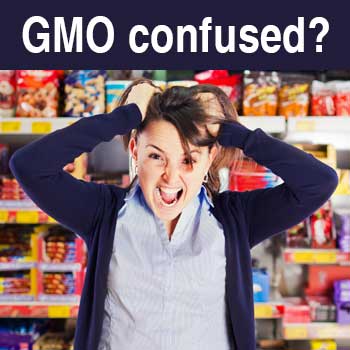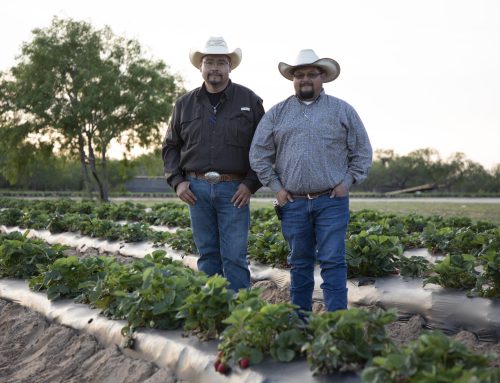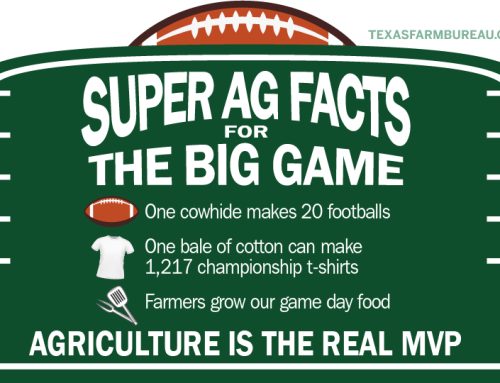Non-GMO. Biotech free. All natural. Seems like shoppers are bombarded with a host of food labels enticing us with the latest buzzword. But how many labels tell the truth about what’s in our food?
I see foods labeled “GMO free” when I know there was no GMO in the product to begin with. It’s a marketing gimmick, pure and simple. And it’s misleading. As consumers, we deserve better than that.
I’ve done some research on the topic, and here’s what I’ve found:
Only eight crops from genetically-modified seeds are commercially available in the United States. They are field and sweet corn, soybeans, cotton, canola, alfalfa, sugar beets, papaya and squash. Varieties of both apples and potatoes have been approved and are reportedly coming to market soon.
There are rumors about the creation and use of biotech seeds for other crops. But today, that’s our list.
That doesn’t mean that GMOs are only in corn, sugar beets, papaya and squash. These products, like hundreds of others, as used in the creation of other foods.
Corn is used to create cornstarch as well as corn and vegetable oil. Cottonseed oil is in a number of products, including potato chips. Soybeans are used to create oil, soy flour and soy protein.
GMOs are in so many products that Hope Hart, the technical leader for product safety at Syngenta, writes: “Seventy to 80 percent of the food on grocery store shelves likely contain processed ingredients from GM plants.”
Now, I don’t have a problem with eating foods that are genetically-modified. Science tells me they are just as healthy for me as other foods. They’re more affordable. And over a trillion meals later, not a single person has become sick as the result of eating GMOs.
If you’re concerned about what’s in your food, I suggest you turn the box around and look at the ingredients list. It’s there to tell you the truth about what’s in your food–not sell you a product based on the catch phrase of the day.










I’d sure like to know the source of the ‘science’ that assures you of GMO safety. Is it the ‘science’ cooked up by the bio-tech industry? Can’t be the science done in other countries where our corporations can’t influence the results.
And no word about the higher residual pesticides in GMO products. We are told GMO requires few pesticides and that’s one of those partial truths Monsanto loves to sling around. There are fewer different pesticides, but a lot more of the one they do use. Just a coincidence that it happens to be Monsanto’s.
Have you ever stopped to think there might be a reason why this marvelous GMO revolution wasn’t glorified from day one like every other scientific revolution? Instead of hiding GMO content, why haven’t they been bragging about it? Why do they hide the results of testing done in this country if the tests show a problem?
There are a whole lot of questions you should be asking if this were intended to be an honest and unbiased article.
I think the real intent of your message is clear to those capable of reading between the lines.
1.) This is an honest and unbiased article. I eat foods both with and without GMOs. The research I obtained is largely from unbiased government agencies like the USDA and FDA. Yes, I also used Forbes, which is a media outlet and GMOAnswers.com.
2.) There have been hundreds of studies by different agencies about the safety of genetically modified foods. The FDA, the USDA and other government agencies (not run by independent companies) say they’re safe. I link to one in the article. They’re independent government agencies. Also, a trillion meals with GMO ingredients have been served and not a single life has been lost.
3.) I’m proud to say I eat GMOs. I also eat organic foods sometimes. I know both are safe, and I’m fine with that.
4.) My family farms. We have GMO crops that we plant because we can use less spray on them.They’re more drought tolerant. They repel insects. And not all of our sprays or seed comes from Monsanto. We use other companies like Syngenta as well.
5.) I believe the reason this GMO revolution was glorified from day one is that it’s been a hundred or so year process. We’ve been slowly manipulating and cross-breeding seeds for decades. The reason people are worried about it now is because fear mongers like the Food Babe, who uses little to no scientific research, says it’s bad for you. I’d much rather trust the word of a legitimate research over a blogger who calls herself a “babe.”
I’m not afraid of GMO content. Suppliers don’t brag about it because it’s in 80 percent of our food anyway.
I respect your opinion. And I respect your right to eat and shop the way you’d like. I’ll shop the way I’d like.
Rather than change the subject to a company that ranks 197th on the Fortune list (Starbucks is bigger) I like to focus on the 2000 plus long term independent studies that have verified what Jessica is writing about. http://www.geneticliteracyproject.org/2013/10/08/with-2000-global-studies-confirming-safety-gm-foods-among-most-analyzed-subject-in-science/ Or – the recently published masterpiece of journalistic research just completed by William Saletan and published in Slate. http://www.slate.com/articles/health_and_science/science/2015/07/are_gmos_safe_yes_the_case_against_them_is_full_of_fraud_lies_and_errors.html No one can seriously claim that Slate is a Monsanto apologist or a Big Ag Rag. The trickle of fair reporting has recently turned into a flood. Once that happens, the story can only be reported one way – like Saletan did in Slate, and what you read by Jessica.
It is apparent that Ms. Domel has not read nor familiarized herself with the material presented in THE GMO DECEPTION edited by Sheldon Krimsky and Jeremy Gruber, The Myths of Safe Pesticides by Andre Leu, Altered Genes,Twisted Truth by Steven M. Druker or The End of Food by Paul Roberts.
In addition, Ms. Domel and her apologists refuse to deal with this fundamental fact that in a Democracy the people -consumers-have a right to know what is in the food that they spend their money on. Only a Stalinist, Non-Democratic system would deny consumers this right.
Bayard Breeding
Well hello Mr. Breeding! Wow, use hyperbole much? I was watching Neil Degrasse Tyson on 60 Minutes not long ago. He said, “Science is true, whether you believe it or not.” I started looking at your titles, knowing what I’d find, and in two minutes, there was this – http://www.biofortified.org/2014/11/the-gmo-deception-is-in-fact-deceptive/ The labeling act just passed will give consumers a system identical to that used to certify and label organic products. Any consumer who wants to do so will have ample opportunity. But, with the avalanche of positive biotech news now being honestly and fairly reported, I’m not thinking it will be an issue in a few years. The federal government likes for labels to mean something. The one you want would provide no useful information and is therefore, a needless cost. I looked at your link, now check out mine. I’ve already posted this once today, but this is the definitive journalistic work on the GMO issue. http://www.slate.com/articles/health_and_science/science/2015/07/are_gmos_safe_yes_the_case_against_them_is_full_of_fraud_lies_and_errors.html